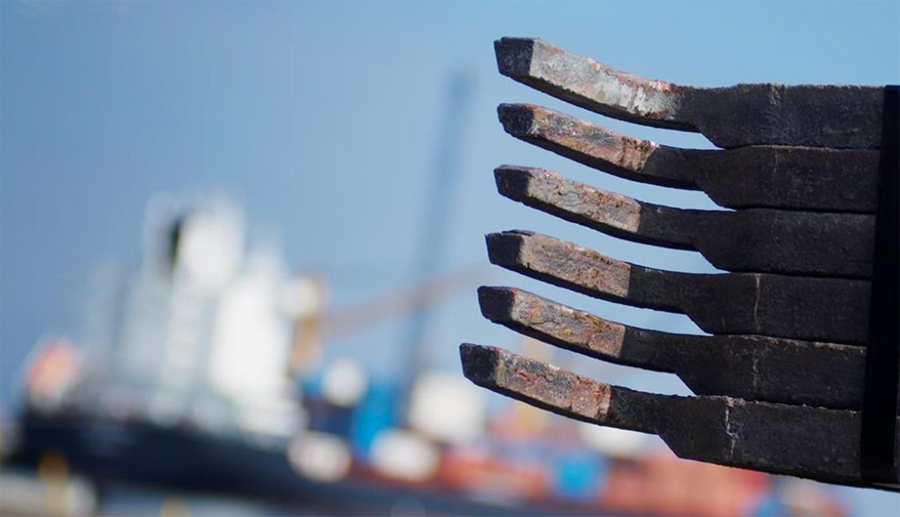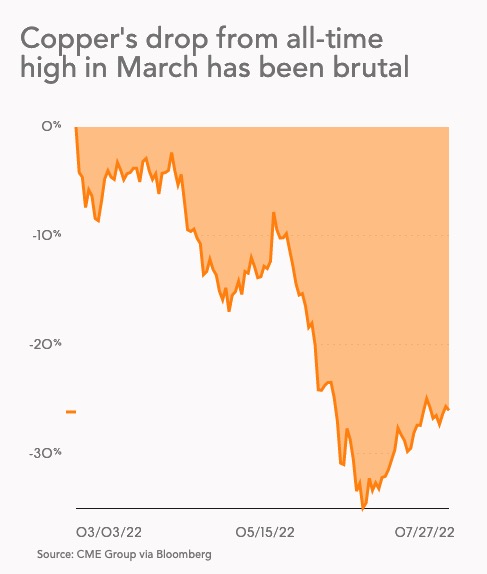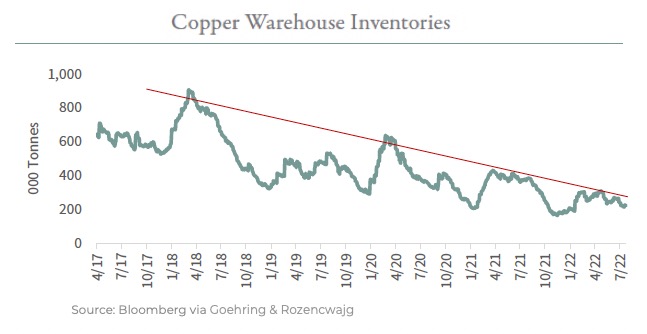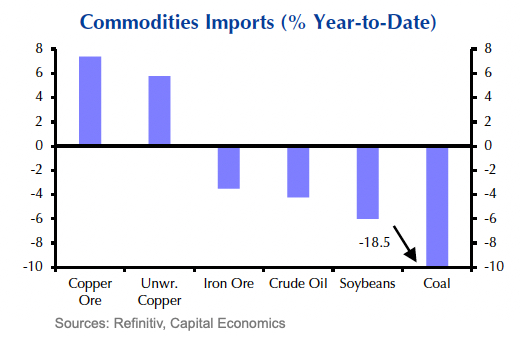Original Source: https://www.mining.com/two-charts-show-copper-price-drop-may-have-been-overdone/

Altonorte anodes port of Antofagasta, Chile. Image from Glencore.
Copper is on track for its worst monthly run of losses since 2015, with another steep decline so far in August. Although off its recent lows, large-scale speculators in the copper market like hedge funds have held net short positions – bets on falling prices – for six weeks running.
A global energy crisis centred in Europe, a slump in China – particularly the crucial property and construction sector – inflation and fears of a recession in the US and a surging dollar have been assigned blame for all the gloom in the copper market at the moment.

Copper’s short term woes frequently butt up against its longer term tailwinds, thanks to its central role in the green energy transition, making accurate forecasting difficult if not impossible.
Bewarehouses
In particular, tracking Goldman Sachs’ trajectory on the copper market has been something of a white knuckle ride.
In February the investment bank predicted a “scarcity episode” by the end of the 2022 as global stocks fell to dangerously low levels.
In April, Goldman forecast copper reaching an all-time high before the end of 2022 because the market was “sleepwalking towards a stock-out.”
In July, with the price falling to a 20-month low, the firm’s analyst conceded that their great expectations for copper in the short term will have to be postponed.
But Goldman’s main argument of the dangers of a “scarcity episode” or a “stock-out” remains well supported.
Days left
WHEN THE CHINESE GOVERNMENT STARTS BUYING COPPER ON THE OPEN MARKET IT’S USUALLY READ AS A SIGN OF PRICES BOTTOMING
Wall Street natural resource investment house Goehring & Rozencwajg Associates in their Q2 update released last week exhibits a five year chart of global copper warehouse inventories.
Goehring & Rozencwajg points out that after bottoming at 165,000 tonnes at the end of 2021, stockpiles rebounded to 300,000 by mid-May, but have since pulled back to 240,000 tonnes:
“When adjusted for days of consumption, inventories are almost as low as they were back in 2005, just before copper prices more than doubled. In 2005, copper exchange inventories covered consumption by only two days.
“By the end of 2021, inventories had fallen to only 2.5 days of consumption, and at 240,000 tonnes today, inventories cover consumption by only 3.5 days – still an extremely low number.”

Shipping news
As for concerns about the appetite of China – responsible for some 55% of the world’s copper consumption – the bellwether metal is the one commodity that is showing positive import growth this year.
China’s unwrought copper imports are up nearly 6% while concentrate shipments are around 7% higher so far this year, encouraged by the fall in price, according to Capital Economics, a London-based research firm. In contrast, cargoes of iron ore, for which China is significantly more reliant on imports than copper, are down 3.5%.
Despite robust imports, physical stocks of copper across the country are at year lows, according to Shanghai Metals Market, dropping to 61,300 tonnes as of Friday.
That is down more than 60% from total inventories of more than 150,000 recorded this time in 2021. SMM also said rumours about strategic stockpiling of copper by China’s state reserves bureau remain “unconfirmed”. When the Chinese government starts buying copper on the open market it’s usually read as a sign of prices bottoming.

Prop up property
Beijing is ramping up measures to prop up the housing market. In July plans for a $44 billion fund backed by the central bank to rescue beleaguered developers came to light.
Over the weekend PBOC slashed its key interest rate by 1.5%, matching its biggest cut on record. Local governments have also started to lend to developers to continue construction of uncompleted homes as buyers threaten non-payment unless their paid-for homes are ready to move in.
As Goldman Sachs pointed out in an October 2021 report, while construction and its associated sectors account for 40% of China’s copper demand, construction itself accounts for 20% and over 90% of that demand comes from completions, not from new starts.
Lower longer
Goldman has hacked its original forecasts and now sees copper averaging only 7,400 a tonne in Q4 2022, down from over $10,000 before.
Goldman joins other sceptics, including Capital Economics ($7,250), JP Morgan ($6,500) and Standard Chartered ($7,850) who see prices going lower from today’s level according to data compiled by FocusEconomics.
Thirteen out of 35 analysts cut their forecast for the copper market in the Barcelona-based researcher’s August survey. The consensus forecast for full year 2023 is $8,400, a rather uninspiring 5% upside from the price in New York early Tuesday.
Goldman’s longer term outlook based on a “clear structural bull story” is $15,000 by 2025.
Better late than never.





